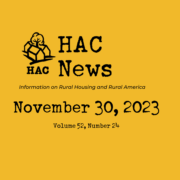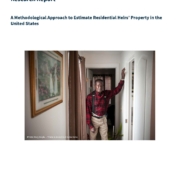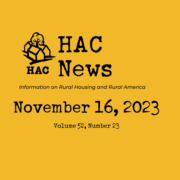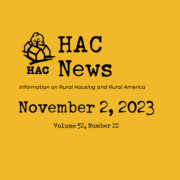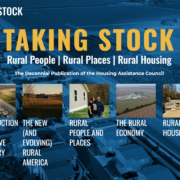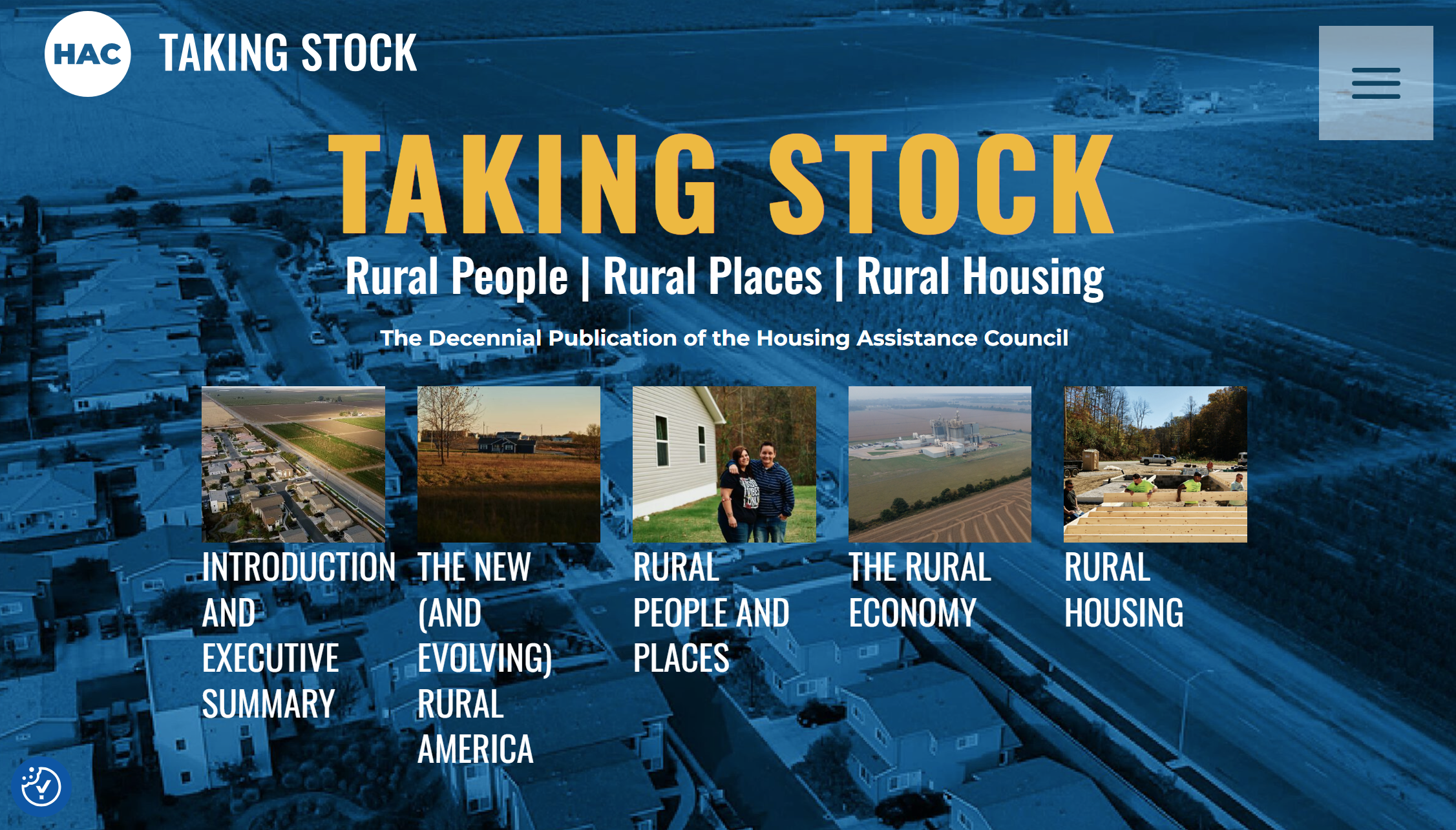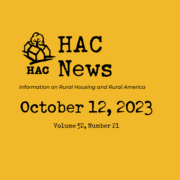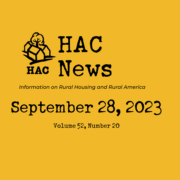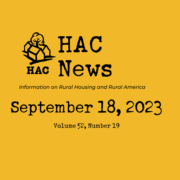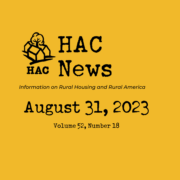HAC News: November 30, 2023
Vol. 52, No. 24
TOP STORIES
HAC provides preliminary analysis of new CRA rule’s rural implications
The new Community Reinvestment Act rule announced in October includes some important provisions for rural housing and community development. A new post on HAC’s website offers a preliminary look at these changes. For example, community development and retail lending are now given equal weight in the exams for large and intermediate sized banks. Also, it is now clear that all of a bank’s community development activities, even those not located in the bank’s defined Assessment Areas, count for CRA purposes. Other revisions are explained as well.
Research posters from HAC conference posted online, awards announced
Explore research posters online from the 2023 National Rural Housing Conference’s research poster session! The posters examine some of the most pressing issues facing rural America. HAC is thrilled to announce our poster contest award winners:
- Most Innovative Research: 18×18 House by Jake Buell, Meagan Mitchell, Julie DiDeo, and Naomi Tony-Alabi
- Overall Favorite Poster – First Place: How to Build Community-Supported Housing: Ideas for Rural Areas by Kenny Fallon Jr.
- Overall Favorite Poster – Second Place: Flood Buyout Programs: Assessing Community Buy-In and Efficacy by Mira Morgan
Fannie Mae extends pilot that reports positive rent payments to credit bureaus
Fannie Mae’s Positive Rent Payment pilot is being extended through December 2024, after its first year saw credit scores increase for almost 58% of participants. Fannie Mae will cover the costs of collecting and disseminating rent payment data for a 12-month period for multifamily property owner/operators of Fannie Mae financed properties who use an approved vendor to collect the data. Owners can enroll online. An explanation for renters is also posted online.
RuralSTAT
Rural America has historically had high homeownership rates. Rates in rural places and nationwide, however, are substantially lower for nonwhite residents than for white non-Hispanic households. Source: HAC tabulations of the U.S. Census Bureau’s 2021 American Community Survey.
OPPORTUNITIES
Environmental justice grants competition opens
EPA’s Community Change Grants program offers funds for environmental and climate justice activities to benefit disadvantaged communities through projects that reduce pollution, increase community climate resilience, and build community capacity to address environmental and climate justice challenges. Eligible applicants are community-based nonprofit organizations that partner with other CBOs, Tribes, local governments, or institutions of higher education. One of the program’s two tracks offers the option to focus on Tribes, U.S. territories, small unincorporated areas, or communities near the U.S.-Mexico border. Technical assistance is available. Applications will be accepted and reviewed on a rolling basis until November 21, 2024. For more information, email CCGP@epa.gov.
Grants offered for states and Tribes to create home efficiency rebate programs
State energy offices and Tribal entities are eligible for Department of Energy grants to create programs for Home Electrification and Appliance Rebates for high-efficiency electric homes and Home Efficiency Rebates for energy-saving retrofits in single-family and multifamily buildings. Rolling application processes are now open for states for both programs, and for Tribes for the Home Electrification and Appliance Rebates program. The American Council for an Energy-Efficient Economy offers information on ways to make these programs work for low-income residents.
Guidance available on tax credits for energy efficiency and community energy projects
The 2022 Inflation Reduction Act created new tax credits and improved existing ones for both property owners and builder/developers, for both housing retrofits and new construction. An overview of new programs is offered by Novogradac. A more detailed chart, published by Home Innovation Research Labs, covers eligibility, requirements, possible combinations with other programs, and more. A Treasury Department post focuses on use of these resources for multifamily housing.
The Section 45L New Energy Efficient Home Tax Credit for developers, including those using the Low Income Housing Tax Credit, is summarized by Novogradac and IRS guidance is offered in Notice 2023-65.
The Department of Energy continues to accept applications for the Low-Income Communities Bonus Credit program, which provides up to a 20 percentage point boost to the Investment Tax Credit for qualified solar or wind facilities in low-income communities. The IRS released final rules and guidance on the program, also called Section 48(e), in August.
Nominations open for historic preservation award
The Advisory Council on Historic Preservation and HUD offer the 2024 ACHP/HUD Secretary’s Award for Excellence in Historic Preservation, which will recognize developers, organizations, and agencies for success in advancing historic preservation goals while providing affordable housing and/or expanded economic opportunities for low- and moderate-income people. Eligible projects must promote the use of historic buildings for affordable housing, community development, and/or expanded economic opportunities; include HUD funds, financing, or other assistance; meet preservation guidelines; and contribute to local and/or Tribal community revitalization efforts. Nominations are due December 18.
REGULATIONS AND FEDERAL AGENCIES
Revisions proposed for Section 502 direct, Section 504, and Section 306C
USDA proposes to amend the regulations for these programs “to reduce the regulatory burdens on applicants, borrowers, and partners by enhancing program delivery, expanding customer service, promoting consistency between the direct and guaranteed SFH loan programs where feasible and aligning the programs with current housing market conditions and mortgage loan practices.” Comments are due January 19. For more information, contact Sonya Evans, USDA, 423-268-4333.
HUD proposes eviction notice for assisted tenants
A proposed rule would require that when tenants who live in public housing or in properties receiving HUD project-based rental assistance face eviction for nonpayment of rent, PHAs and owners would need to provide written notice at least 30 days before beginning a formal eviction procedure. Comments are due January 30. Contacts for more information vary by program and are listed in HUD’s notice.
Treasury clarifies timing for spending Coronavirus State and Local Fiscal Recovery Funds
In an interim final rule, the Treasury Department proposes to amend the definition of “obligation” in its regulations for the Coronavirus State Fiscal Recovery Fund and the Coronavirus Local Fiscal Recovery Fund. The changes, which will clarify when monies must be committed and spent, are effective November 20, but Treasury will accept comments until December 20. For more information, contact Jessica Milano, Treasury, 844-529–9527.
EVENTS
HUD to offer “Manufactured Housing and Tribal Communities” webinar
The session, set for December 6, will discuss specific considerations and recommendations for Tribal grantees interested in developing manufactured housing. It is the latest in a series of HUD manufactured housing webinars. Recordings and materials of past sessions will be posted online.
PUBLICATIONS AND MEDIA
USICH releases homelessness research agenda
On November 30, the U.S. Interagency Council on Homelessness published the first federal homelessness research agenda in more than a decade. The document, titled From Evidence to Action, is intended to shape federal investments in homelessness research and offer a roadmap to understand what works to prevent and end homelessness in the United States. It acknowledges that guidance must be tailored for specific populations and geographies including remote, rural, and Tribal lands.
ERS publishes rural data overview
USDA’s Economic Research Service has released its 2023 Rural America at a Glance report. The annual publication describes important demographic, economic, social, and housing trends over the last year. This year it shows that rural employment and annual growth rates are nearly back to pre-pandemic levels. A recorded webinar covering the report will also be available online.
HAC
HAC’s office is moving
After 43 years in our current D.C. location, HAC is moving. Our new street address, effective on January 1, 2024, will be 1828 L Street, N.W., Suite 505, Washington, DC 20036. Our phone number will remain 202-842-8600.
HAC is hiring
- The Rental Housing Development and Preservation – Housing Specialist will provide technical assistance support to nonprofit organizations involved in multifamily housing programs, with a specific focus on USDA 515 and HUD rural housing programs. This position is remote work eligible.
- The Rental Housing Development and Preservation Housing Specialist – Senior Level Position is a senior-level role that combines expertise in multifamily housing programs, specifically focusing on USDA 515 and HUD rural housing programs, with the responsibility of providing technical assistance, with a particular focus on transfers of USDA 515 properties. This position is remote work eligible.
Need capital for your affordable housing project?
HAC’s loan fund provides low interest rate loans to support single- and multifamily affordable housing projects for low-income rural residents throughout the U.S. and territories. Capital is available for all types of affordable and mixed-income housing projects, including preservation, new development, farmworker, senior and veteran housing. HAC loan funds can be used for pre-development, site acquisition, site development, construction/rehabilitation and permanent financing. Contact HAC’s loan fund staff at hacloanfund@ruralhome.org, 202-842-8600.
Please note: HAC is not able to offer loans to individuals or families. Borrowers must be nonprofit or for-profit organizations or government entities (including tribes).
Want to reprint a HAC News item?
Please credit the HAC News and provide a link to HAC’s website. Thank you!

